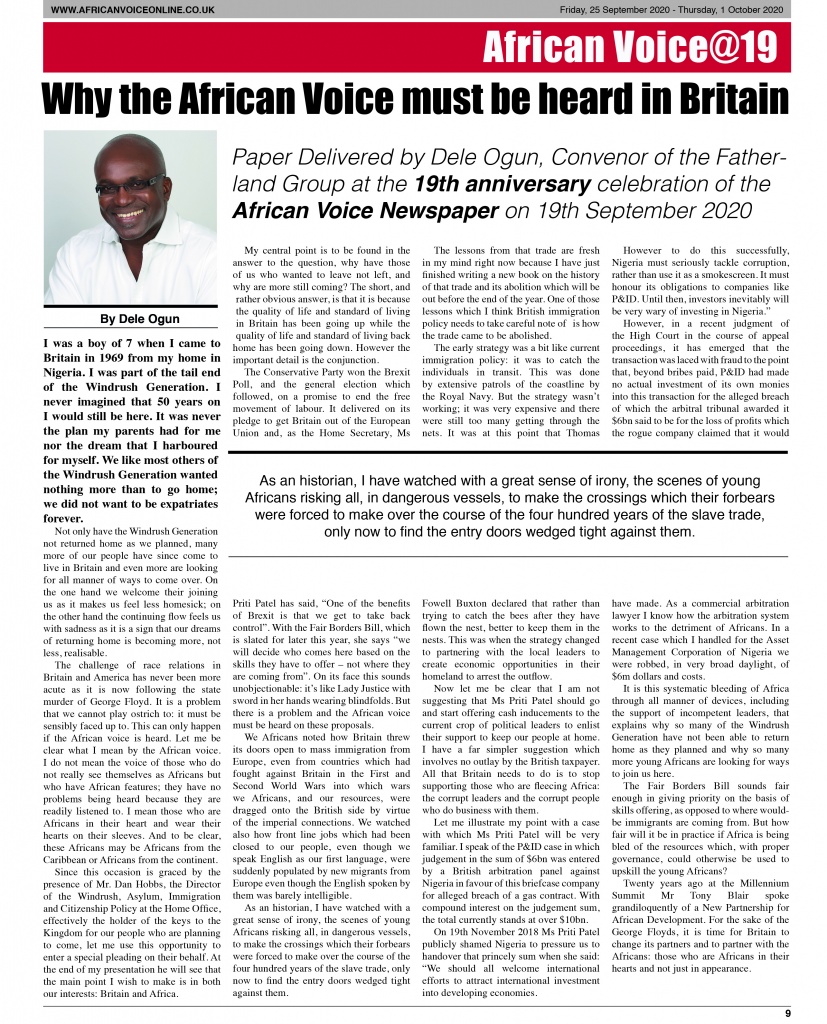


Paper Delivered by Dele Ogun, Convenor of the Fatherland Group at the 19th anniversary celebration of the African Voice Newspaper on 19th September 2020
By Dele Ogun – I was a boy of 7 when I came to Britain in 1969 from my home in Nigeria. I was part of the tail end of the Windrush Generation. I never imagined that 50 years on I would still be here. It was never the plan my parents had for me nor the dream that I harboured for myself. We like most others of the Windrush Generation wanted nothing more than to go home; we did not want to be expatriates forever.
Not only have the Windrush Generation not returned home as we planned, many more of our people have since come to live in Britain and even more are looking for all manner of ways to come over. On the one hand we welcome their joining us as it makes us feel less homesick; on the other hand the continuing flow fills us with sadness as it is a sign that our dreams of returning home is becoming less realisable.
The challenge of race relations in Britain and America has never been more acute as it is now following the state murder of George Floyd. It is a problem that we cannot play ostrich to: it must be sensibly faced up to. This can only happen if the African voice is heard. Let me be clear what I mean by the African voice. I do not mean the voice of those who do not really see themselves as Africans but who have African features; they have no problems being heard because they are readily listened to. I mean those who are Africans in their heart and wear their hearts on their sleeves. And to be clear, these Africans may be Africans from the Caribbean of Africans from the continent.
Since this occasion is graced by the presence of Mr. Dan Hobbs, the Director of the Windrush, Asylum, Immigration and Citizenship Policy at the Home Office, effectively the holder of the keys to the Kingdom for our people who are planning to come, let me use this opportunity to enter a special pleading on their behalf. At the end of my presentation he will see that the main point I wish to make is in both our interests: Britain and Africa. My central point is to be found in the answer to the question, why have those of us who wanted to leave not left, and why are more still coming? The short, and rather obvious answer, is that it is because the quality of life and standard of living in Britain has been going up while the quality of life and standard of living back home has been going down. However the important detail is the conjunction.
The Conservative Party won the Brexit Poll, and the general election which followed, on a promise to end the free movement of labour. It delivered on its pledge to get Britain out of the European Union and, as the Home Secretary, Ms Priti Patel has said, “One of the benefits of Brexit is that we get to take back control”. With the Fair Borders Bill, which is slated for later this year, she says “we will decide who comes here based on the skills they have to offer – not where they are coming from”. On its face this sounds unobjectionable: it’s like Lady Justice with sword in her hands wearing blindfolds. But there is a problem and the African voice must be heard on these proposals.
We Africans noted how Britain threw its doors open to mass immigration from Europe, even from countries which had fought against Britain in the First and Second World Wars into which wars we Africans, and our resources, were dragged onto the British side by virtue of the imperial connections. We watched also how front line jobs which had been closed to our people, even though we speak English as our first language, were suddenly populated by new migrants from Europe even though the English spoken by them was barely intelligible.
As an historian, I have watched with a great sense of irony, the scenes of young Africans risking all, in dangerous vessels, to make the crossings which their forbears were forced to make over the course of the four hundred years of the slave trade, only now to find the entry doors wedged tight against them. The lessons from that trade are fresh in my mind right now because I have just finished writing a new book on the history of that trade and its abolition which will be out before the end of the year. One of those lessons which I think British immigration policy needs to take careful note of is how the trade came to be abolished.
The early strategy was a bit like current immigration policy: it was to catch the individuals in transit. This was done by extensive patrols of the coastline by the Royal Navy. But the strategy wasn’t working; it was very expensive and there were still too many getting through the nets. It was at this point that Thomas Fowell Buxton declared that rather than trying to catch the bees after they have flown the nest, better to keep them in the nests. This was when the strategy changed to partnering with the local leaders to create economic opportunities in their homeland to arrest the outflow.
Now let me be clear that I am not suggesting that Ms Priti Patel should go and start offering cash inducements to the current crop of political leaders to enlist their support to keep our people at home. I have a far simpler suggestion which involves no outlay by the British taxpayer. All that Britain needs to do is to stop supporting those who are fleecing Africa: the corrupt leaders and the corrupt people who do business with them.
Let me illustrate my point with a case with which Ms Priti Patel will be very familiar. I speak of the P&ID case in which judgement in the sum of $6bn was entered by a British arbitration panel against Nigeria in favour of this briefcase company for alleged breach of a gas contract. With compound interest on the judgement sum, the total currently stands at over $10bn.
On 19th November 2018 Ms Priti Patel publicly shamed Nigeria to pressure us to handover that princely sum when she said: “We should all welcome international efforts to attract international investment into developing economies. However to do this successfully, Nigeria must seriously tackle corruption, rather than use it as a smokescreen. It must honour its obligations to companies like P&ID. Until then, investors inevitably will be very wary of investing in Nigeria.”
However, in a recent judgment of the High Court in the course of appeal proceedings, it has emerged that the transaction was laced with fraud to the point that, beyond bribes paid, P&ID had made no actual investment of its own monies into this transaction for the alleged breach of which the arbitral tribunal awarded it $6bn said to be for the loss of profits which the rogue company claimed that it would have made. As a commercial arbitration lawyer I know how the arbitration system works to the detriment of Africans. In a recent case which I handled for the Asset Management Corporation of Nigeria we were robbed, in very broad daylight, of $6m dollars and costs.
It is this systematic bleeding of Africa through all manner of devices, including the support of incompetent leaders, that explains why so many of the Windrush Generation have not been able to return home as they planned and why so many more young Africans are looking for ways to join us here.
The Fair Borders Bill sounds fair enough in giving priority on the basis of skills offering, as opposed to where would-be immigrants are coming from. But how fair will it be in practice if Africa is being bled of the resources which, with proper governance, could otherwise be used to upskill the young Africans?
Twenty years ago at the Millennium Summit Mr Tony Blair spoke grandiloquently of a New Partnership for African Development. For the sake of the George Floyds, it is time for Britain to change its partners and to partner with the Africans: those who are Africans in their hearts and not just in appearance.
Kindly follow us on twitter:@AfricanVoice2










